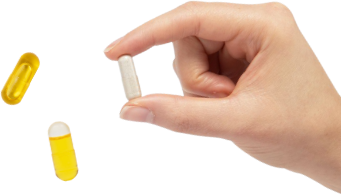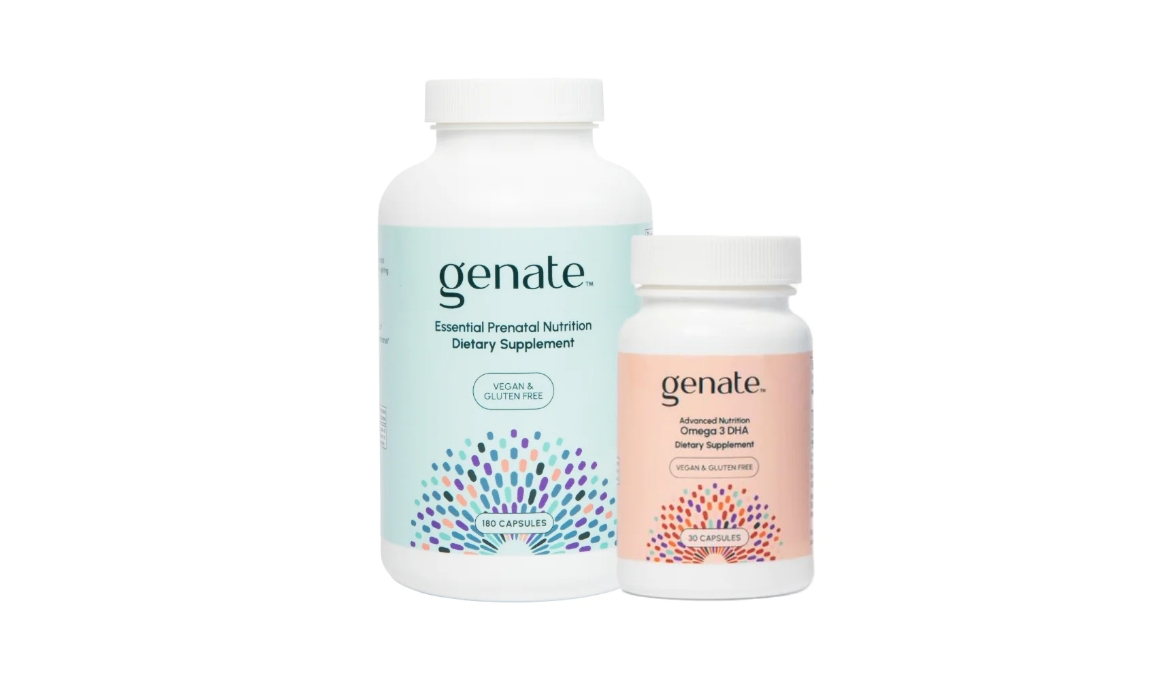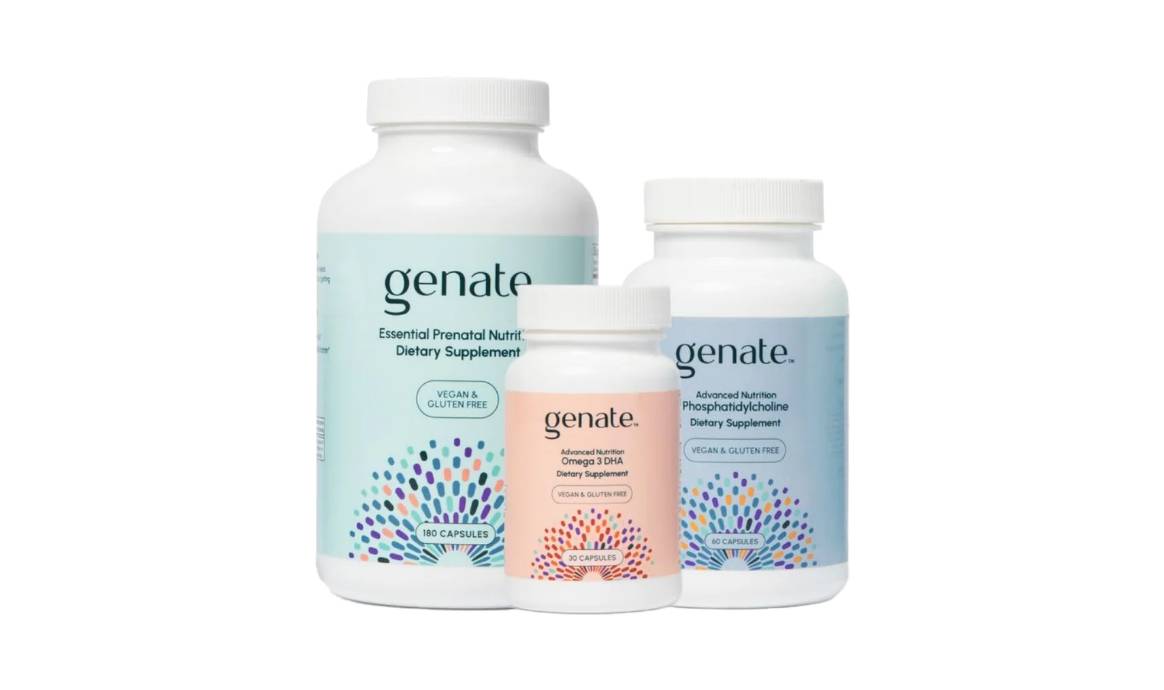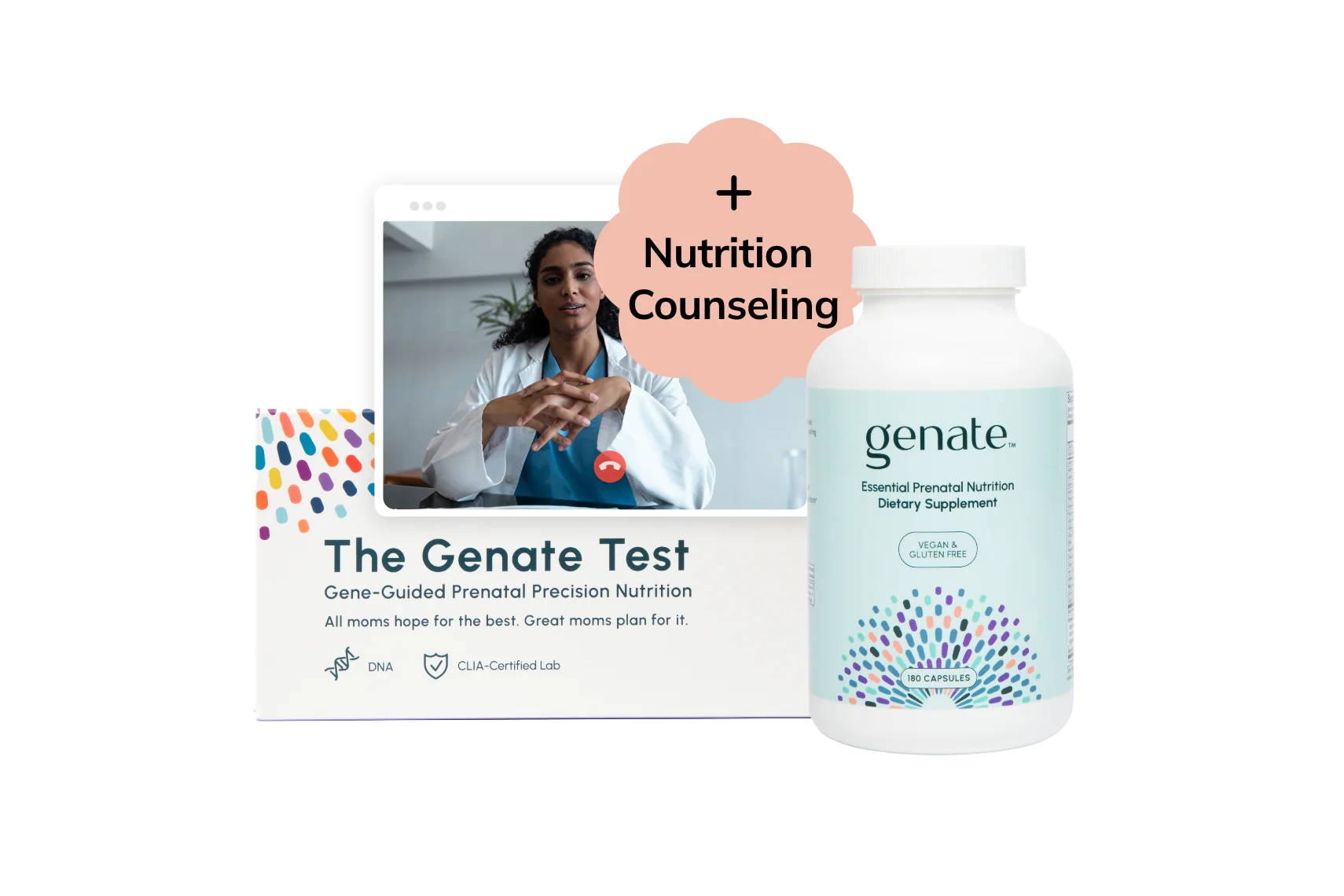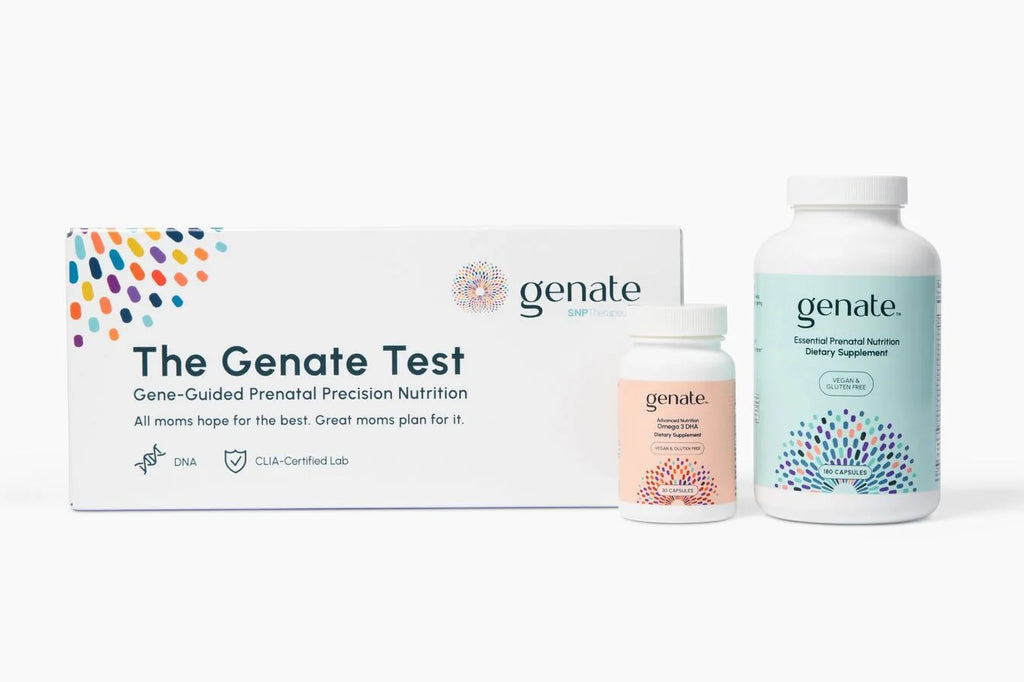Good nutrition is essential for every stage of your baby’s growth and development. But the efficiency with which your body metabolizes nutrients is partly determined by your genes, and common genetic variants can affect the metabolism of one-carbon nutrients that are critical for the development of your child’s brain and spinal cord. Genate Essential Prenatal Nutrition is a multivitamin formulated from academic research that provides women with a formulation optimized to support their baby’s cognitive development. It includes the one-carbon nutrients choline, betaine, methylfolate, and B vitamins that many women have trouble metabolizing and/or don’t get enough of in their diet.

PRENATALS
The Importance of Docosahexaenoic Acid (DHA) During Pregnancy
by Genate • September 1, 2023 • Updated August 26, 2024 • 6-8 minute read
Proper nutrition during pregnancy is vital for the well-being of the mother and the developing baby. Expecting mothers can benefit greatly from following a well-balanced diet that emphasizes nutrients like DHA to support a healthy pregnancy and long-term development of the child.
Docosahexaenoic acid (DHA), an omega-3 fatty acid, is particularly important during pregnancy for development of a baby’s brain and eyes. Understanding the significance of DHA and including it in the maternal diet can help expecting mothers improve their health and contribute to the growth and development of their babies.
Read on to learn more about the importance of DHA during pregnancy and how to incorporate it into a well-rounded diet.
What is DHA and Why Is It Important During Pregnancy?
DHA, short for docosahexaenoic acid, is one of three omega-3 fatty acids. Omega-3s are polyunsaturated fats that support eye and brain health by serving as vital structural components of cell membranes in the brain and retina. While they’re essential for a healthy pregnancy, our bodies cannot produce them in large amounts, so we must obtain them from dietary sources.
DHA is primarily found in fatty fish, such as salmon, mackerel, sardines and tuna, along with certain algae. It is a vital structural component of cell membranes in the brain, retina, and sperm cells. DHA, in particular, also plays a crucial role in brain development and function.
In addition to DHA, there are two other omega-3 fatty acids: EPA (Eicosapentaenoic Acid) and ALA (Alpha-Linolenic Acid). EPA primarily supports heart health by reducing inflammation and improving blood vessel function. ALA is a plant-based omega-3 fatty acid that primarily focuses on reducing the risk of heart disease and supporting overall well-being; however, its conversion into the more biologically active forms is limited in humans. Of these, DHA is the most important during pregnancy.
The Importance of Sufficient DHA During Pregnancy
DHA is critical to fetal brain development and cognitive function during pregnancy. During this time, the mother transfers DHA to the developing fetus, contributing to the baby's brain and nervous system formation. Adequate DHA intake during pregnancy can improve cognitive outcomes in children, enhancing attention and learning abilities.
During pregnancy, DHA is also crucial for the structural integrity of brain cells and fosters the development of neural connections and the production of neurotransmitters (chemical messengers in the brain that facilitate communication between brain cells). Sufficient DHA during pregnancy through maternal diet or supplementation is essential for promoting healthy cognitive function in children.
Brain Development
Eye Health
Full-Term Pregnancies
Maternal Health Benefits
In addition to its effects on fetal development, DHA supplementation during pregnancy can potentially benefit mothers. Research suggests that DHA may reduce the risk of postpartum depression. It has also been associated with improved cognitive function in mothers and a potential protective effect against age-related cognitive decline. DHA supplementation is also linked to maternal well-being, including improved cardiovascular health and reduced inflammation.
How Much DHA Do You Need During Pregnancy?
According to international guidelines, women should aim for 500-600 mg DHA (or DHA and EPA) during pregnancy. This can be provided in the form of food or supplements.
What Can Result From a DHA Deficiency?
While research is limited, evidence suggests not getting enough DHA during pregnancy can compromise fetal development; however, the long-term implications are not fully understood.
Taking Prenatals with DHA
DHA supplementation is invaluable for expecting mothers to meet their nutritional goals during pregnancy. Prenatal vitamins with added omega-3s can help ensure an adequate intake of DHA.
When choosing prenatal vitamins with DHA, consider the quality and purity of the DHA source to ensure the safety and effectiveness of the supplement. Look for reputable brands that source from reliable and sustainable fish or algae sources. Third-party testing and certifications can provide additional assurance of product quality.
Many professionals recommend taking prenatals with DHA as soon as you begin planning for pregnancy or find out you are pregnant. This early initiation helps ensure that your body has sufficient levels of DHA from the earliest stages of fetal development, supporting your baby's overall growth and well-being.
Remember to consult your healthcare provider for personalized recommendations based on your specific health needs and circumstances.
How to Incorporate DHA into Your Diet During Pregnancy
Getting enough DHA during pregnancy doesn't have to be complicated. Various sources of DHA can be incorporated into your meals. Some options include:
1. Fatty Fish and Seafood
Incorporating fatty fish such as salmon, mackerel, sardines, and tuna into your diet can provide significant amounts of DHA. Shoot for 2-3 servings per week to meet your DHA requirements during pregnancy.
2. Supplements
DHA supplements, such as fish oil or algae oil capsules, are available for those who may not consume enough DHA in their diet during pregnancy. These supplements can benefit individuals who don't eat fish or have specific dietary restrictions. Always consult with your healthcare provider beforehand for personalized recommendations on dosage and brand.
3. Vegan and Vegetarian Sources
For pregnant mothers following plant-based diets, certain foods provide ALA, which the body can partially convert to DHA. Good sources include flaxseeds, chia seeds, hemp seeds and walnuts. However, it's important to note the conversion of ALA to DHA is limited, so considering DHA supplementation during pregnancy may be beneficial.
Are You Getting Enough DHA? Find Out With The Genate Test
Ensuring adequate DHA intake and proper nutrition during pregnancy is crucial for the health and well-being of both the mother and the developing baby. Omega-3s, including DHA, play a vital role in brain development, eye health and overall fetal growth. DHA supports cognitive function and reduces the risk of preterm birth.
To ensure you are getting enough DHA during pregnancy, consider taking The Genate Test. The Genate Test is a cutting-edge nutri-genetic test that provides personalized insights into your specific nutrient needs based on your genetic profile. This test enables us to analyze specific genetic markers and reveal valuable information about your body's ability to process and utilize DHA and other essential nutrients.
Consider pairing The Genate Test with our nutri-genetic counseling for expert guidance and recommendations tailored to your unique genetic makeup. You can gain a deeper understanding of your nutritional needs, make informed choices about your diet and supplementation and optimize your health and the health of your child throughout every trimester.
Remember, every pregnancy is different and personalized care is essential. Consult with your healthcare provider or a qualified genetic counselor to discuss The Genate Test and how it can benefit you and your baby. Taking proactive steps to ensure you get enough DHA and other essential nutrients will help you support a healthy and thriving pregnancy journey.
This article is not intended as medical advice to treat or diagnose any health condition but rather as educational health information for the general public. It should not be used as a substitute for individualized medical care from your healthcare provider.
Shop the Article
Save 23% today!
Genate Essential Prenatal Multivitamin + Advanced Omega-3 DHA Package
Bundle to increase savings and provide the foundational nutrients needed for optimal health and development.
From $72 per month
Save 23% today!
Comprehensive Prenatal Support Package
Genate Essential Prenatal Multivitamin + Advanced Omega-3 DHA + Phosphatidylcholine
Our most comprehensive bundle - you’ll receive our Essential Prenatal Multivitamin, Advanced Phosphatidylcholine, and Advanced Omega-3 DHA.
From $110 per month
Save 30% today!
Comprehensive Prenatal Nutrition Bundle
Buy the Genate Test and a nutrition counseling session with a Genate registered dietitian, and receive a 30-day supply of the Genate Essential Prenatal Multivitamin FREE. Purchase includes a 90-day prenatal multivitamin subscription at our best monthly price.
$309
Take the Genate Quiz
Take our Nutrition Quiz to learn more about your nutrition journey.
Read Our Latest Articles
Frequently Asked Questions
What are the benefits of my baby getting the proper nutrients?
What are one-carbon nutrients and fatty acids, and why are they important?
One-carbon nutrients and fatty acids are critical for brain and spinal cord development during pregnancy and through the first two years of life. Although all nutrients are important, the one-carbon nutrients choline, folate, betaine, and B vitamins, along with the omega-3 fat DHA, provide the building blocks for proper growth of your developing baby's brain. Research at Cornell and Harvard universities has shown cognitive benefits for children born to mothers who received increased levels of one-carbon nutrients during pregnancy, demonstrating that optimal nutrition during pregnancy can have lasting effects for your baby.
If I buy Genate nutrition supplements, do I still need to take the test?
Genetic testing is a personal choice, and only you can decide what’s best for you and your baby. But the Genate Test is a powerful tool for optimizing your nutrition status, as it identifies genetically-caused metabolic inefficiencies that may influence your body’ ability to make and use the nutrients critical for your baby’s cognitive development. If you have SNPs in any of the nutrient pathways tested, your Genate Report will provide personalized recommendations for optimizing your nutrition. Our registered dietitians can show you how to fill in the gaps with foods and supplementation, if needed, to make sure you’re getting the nutrition you and your baby need.

